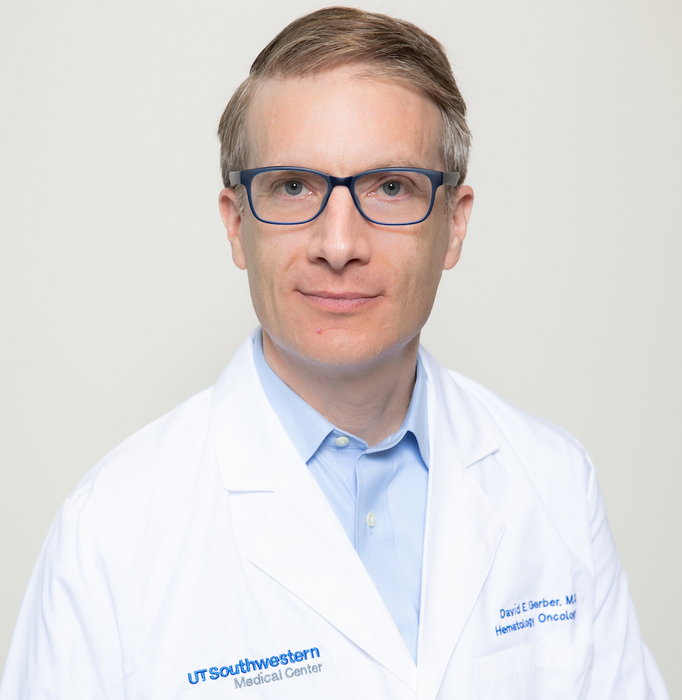A clinical trial is only as powerful as its participants. For years, researchers have struggled to fill clinical trials and enroll sufficiently diverse groups of patients for results to reflect the broader population, in part because of stringent guidelines on who can participate.

Credit: UT Southwestern Medical Center
A clinical trial is only as powerful as its participants. For years, researchers have struggled to fill clinical trials and enroll sufficiently diverse groups of patients for results to reflect the broader population, in part because of stringent guidelines on who can participate.
In an effort to include a larger and more diverse population, an international team of researchers and policymakers has written new recommendations on how to determine eligibility criteria for lung cancer clinical trials. The group was led in part by David Gerber, M.D., Associate Director for Clinical Research at UT Southwestern’s Harold C. Simmons Comprehensive Cancer Center, along with representatives from the Food and Drug Administration (FDA), National Cancer Institute, European Medicines Agency, pharmaceutical companies, and the LUNGevity Foundation.
The recommendations, published today in JAMA Oncology, offer the first publicly available outline of upcoming FDA draft guidance on lung cancer clinical trials that are expected to make it easier to include more patients.
“This paper is the public’s first look at the FDA’s proposed changes to how we determine who can participate in a lung cancer clinical trial,” said Dr. Gerber, Professor of Internal Medicine in the Hematology/Oncology Division at UTSW. “If these changes are successful, they could make clinical trials for lung cancer as well as other cancers more powerful and more representative.”
Ensuring that people from diverse backgrounds join clinical trials is key to properly evaluating how a new treatment will work among patients of all races and ethnicities. But today, only about 5% of all cancer patients enroll in a clinical trial, and only 11% of cancer clinical trial participants identify as a racial or ethnic minority.
For patients with cancer, participation in clinical trials requires not just a decision to try an experimental treatment, but time and energy spent understanding the trial, enrolling in it, and often attending extra testing or clinic appointments. Many researchers agree that complicated, inconsistent, poorly explained, and overly strict eligibility requirements to join a cancer clinical trial exacerbate this problem and are a key reason for the low number of underrepresented minorities in clinical trials.
“So many clinical trials never finish enrollment, close prematurely, or don’t recruit a population that lets researchers generalize the results,” Dr. Gerber said. “I think there’s widespread recognition that eligibility criteria have become too stringent.”
To tackle this problem in one cancer subtype – advanced non-small cell lung cancer (NSCLC) – the LUNGevity Foundation convened a roundtable discussion with experts from academia, industry, and regulatory bodies. The team assembled a prioritized list of eligibility categories that should be included in the descriptions of all NSCLC clinical trials and recommended criteria for each category. Some suggestions were more lenient than what has typically been included in previous NSCLC trial eligibility criteria; for instance, the team recommended that most patients with prior or concurrent cancers, most patients with brain metastases, and most patients with mild liver impairment – all of whom would likely have been excluded in the past – still be included in trials.
The team also suggested that these categories be clearly laid out on public websites advertising clinical trials in an easily searchable format.
The FDA will be releasing draft guidance on NSCLC clinical trials in the near future and hold a public comment period before finalizing them. Other interdisciplinary teams have already convened to standardize eligibility requirements for clinical trials of other cancer types.
If the new guidelines are effective, Dr. Gerber said clinical trials will likely be easier to fill and provide more complete and timely data on new cancer interventions.
“If you can involve more patients in clinical trials, you’re more likely to complete those trials quickly. That’s going to lead to new treatments faster,” he said.
Other authors of the paper include Harpreet Singh and Erin Larkins of the FDA; Andrea Ferris and Upal Basu Roy of LUNGevity Foundation; Patrick M. Forde of Johns Hopkins University; and Wendy Selig of WSCollaborative LLC.
Dr. Gerber holds the David Bruton, Jr. Professorship in Clinical Cancer Research.
About UT Southwestern Medical Center
UT Southwestern, one of the nation’s premier academic medical centers, integrates pioneering biomedical research with exceptional clinical care and education. The institution’s faculty has received six Nobel Prizes, and includes 26 members of the National Academy of Sciences, 17 members of the National Academy of Medicine, and 14 Howard Hughes Medical Institute Investigators. The full-time faculty of more than 2,900 is responsible for groundbreaking medical advances and is committed to translating science-driven research quickly to new clinical treatments. UT Southwestern physicians provide care in more than 80 specialties to more than 100,000 hospitalized patients, more than 360,000 emergency room cases, and oversee nearly 4 million outpatient visits a year.
Journal
JAMA Oncology




